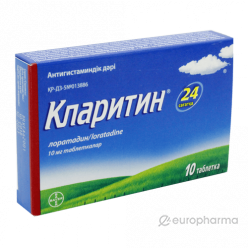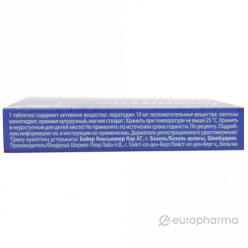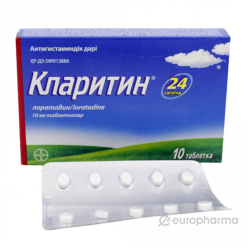
Everything you want to know about our company.



Instructions for medical use
Claritin®
Claritin®
International nonproprietary name
Loratadine
Dosage form
Tablets 10 mg
One tablet includes:
active substance: loratadine 10 mg
adjuvants: lactose monohydrate, corn starch, magnesium stearate
Description
Oval tablets of white color to whitish color with braking cut and intagliation in the form of symbol “flask in cup” and figure “10) on one side of tablet and smooth on the other side, free from visible foreign substances.
Pharmacotherapeutic group
Antihistamines of systemic effect. Other antihistamines of systemic effect. Loratadine.
Code АТХ R06AX13
Pharmacological properties
Pharmacokinetics
Loratadine is quickly absorbed and metabolized in gastrointestinal system. Semi-excretion period of loratadine in blood plasma is 1 hour and its active metabolite – 2 hours. Period of semi-excretion of loratadine is average 8.4 hours (varies from 3 to 20 hours) and desloratadine – 28 hours (varies from 8.8 to 92 hours). Influence on area under concentration-time curve(AUC) of metabolites is higher in comparison with influence of only loratadine. Loratadine is more close to proteins of blood plasma (97% - 99%), in comparison with its active metabolites (73% – 76%).
It is excreted with urine (about 40%) and faeces (about 42%) within 10 days mainly in the form of conjugated metabolites.
Clinical study has found that pharmacokinetic profile of loratadine and its metabolites is comparable between young and elderly volunteers.
Patients with chronic kidney diseases have increased maximal plasma concentration Cmax and AUC of loratadine and its metabolites in comparison with healthy patients. Such patients have semi-excretion period of loratadine and its metabolites slightly different from healthy patients. Hemodialysis does not pay influence on pharmacokinetics of loratadine and its active metabolite.
In case of Childs-Pugh B disease, values Cmax and AUC of loratadine is doubled, however in the whole pharmacokinetic profile of these patients is slightly different from profile of healthy patients. Semi- excretion period of loratadine and its metabolites is 24 hours and 37 hours correspondently and increased in case of hepatic failure.
Pharmacodynamics
Claritine is an antihistaminic agent – selective blocker of peripheral Н1-histamine receptors.
Claritin does not show anticholinergic and sedative effect for the most patients provided that it is used in recommended doses.
During prolonged treatment there are no found clinically significant changes in main indicators of essential functions, indicators of laboratory tests, visual inspection or ECG.
Loratadine does not have expressed activity in relation to Н2-receptors. The drug does not inhibit absorption of norepinephrine and practically it does not pay influence on vascular system or activity of artificial pacemaker.
Antiallergic effect is shown within the first 1-3 hours after use of the drug and reaches maximum within 8-12 hours, then lasts within 24 hours. There is no marked development of resistance to activity of the drug in 28 days of use of loratadine.
Indications
- symptomatic treatment of allergic rhinitis
- symptomatic treatment of allergic skin diseases
Dosage and methods of use
Adult and children over 12 years: 10 mg (1 tablet) once per day.
Children from 6 to 12 years old: weight> 30 kg – 10 mg (1 tablet) once per day, weight < 30 kg – 5 mg (1/2 tablets) once per day.
Lower starting doses of the drug should be prescribed for patients with hepatic failure, because decrease of loratadine clearance is possible. Recommended starting dose for adults and children with weight more than 30 kg is 10 mg every other day.
Adverse reaction
Adverse events are marked according to frequency of their occurrence during clinical studies and use in post-approval period: very frequent (1/10); frequent (from 1/100 to <1/10); infrequent (from 1/1000 to <1/100); rare (1/10000 to <1/1000); very rare (<1/10000), unknown (frequency cannot be defined on the basis of available data).
Very rare
Disorders of immune system: anaphylaxis including angioneurotic edema.
Disorders of nervous system: dizziness, convulsion
Disorders of heart-vascular system: tachyrhythmia, palpitation
Gastrointestinal distress: nausea, dryness of the mouth, gastritis
Hepatobiliary disordera: liver function abnormality
Skin and subcutaneous tissue disorders: rash, alopecia
Systemic disturbance: fatiguability
Children
Nervousness (2.3%), headache (2.7%) and fatiguability (1%) are met more frequent for children under 12 years old.
Contraindications
- hypersensitivity to any component of the drug
- lactation period
- children under 6 years old
Drug interaction
In case of joint proscription with alcohol, Claritin does not pay influence on speed ofpsychomotor ability.
Loratadine level is increased that can be accompanied with increased frequency of adverse reactions in case of joint prescription with inhibitors CYP3A4 or CYP2D6. However in case of joint use with ketoconazole, erythromycin and cimetidine, there were increased concentration of loratadine in blood plasma, but this increase was not expressed clinically including according to ECG data.
Special indications
Claritin should be prescribed for patients with serious liver function abnormality with caution.
Claritin includes lactose. Therefore it should not be prescribed for patients with rare hereditary disorders connected with fructose intolerance, deficit of ferment of Lapp-lactose, glucose-galactose malabsorption.
Use of Claritin should be stopped 48 hours prior to skin diagnostic allergy tests for prevention of spurious results.
Pregnancy and lactation period
Prescription of Claritin during pregnancy is justified only if potential benefit for women increases potential risk for fetus. The drug is excreted withbreast milk, therefore it is required to choose to stop using the drug or breast feeding.
Effects on ability to drive and use potentially dangerous machines
In recommended doses Claritin does not pay influence on ability to drive vehicles or to use complicated technical equipment. However patients shall be notified on potential risk in connection with development of symptoms of dizziness that can pay influence on ability to drive vehicles or to use complicated technical equipment.
Overdosage
Symptoms: sleepiness, tachyrhythmia and headache.
Treatment: symptomatic and supporting treatment during necessary period of time. Gastric lavage, powdered absorbent carbon with water. Loratadine does not excrete by hemodialysis. After emergency aid a patient shall stay under medical observation.
Form of output and packing
10 tablets shall be placed in blister made of polyvinylchloride film and aluminium foil.
1 blister together with medical use instruction in Kazakh and Russian is placed in cardboard package.
Storage conditions
Do not store above 25 °C.
Keep out of the reach of children!
Shelf life
3 years.
Do not use after the expiration date.
Conditions for drug supply
On prescription
Industriepark 30,
B-2220 Heist-op-den-Berg, Belgium
Holder of the Registration Certificate
Bayer Consumer Care AG, Switzerland
Name, address and contact data of the organization receiving claims (offers) from consumers regarding the quality of products on the territory of the Republic of Kazakhstan
“Bayer KAZ” LLP
Timiryazev Street, 42, Pav. 15, Off. 301
050057 Almaty, Republic of Kazakhstan
Tel: +7 727 258 80 40, fax: +7 727 258 80 39
e-mail: kz.claims@bayer.com
Name, address and contact data of the organization responsible for post approval supervision over drug safety on the territory of the Republic of Kazakhstan
“Bayer KAZ” LLP
Timiryazev Street, 42, Pav. 15, office 301
050057 Almaty, Republic of Kazakhstan
Tel: +7 701 715 78 46(24 hours)
Tel.: +7 727 258 80 40 ext. 106 (during working hours)
Fax: +7 727 2588 039
e-mail: pv.centralasia@bayer.com
